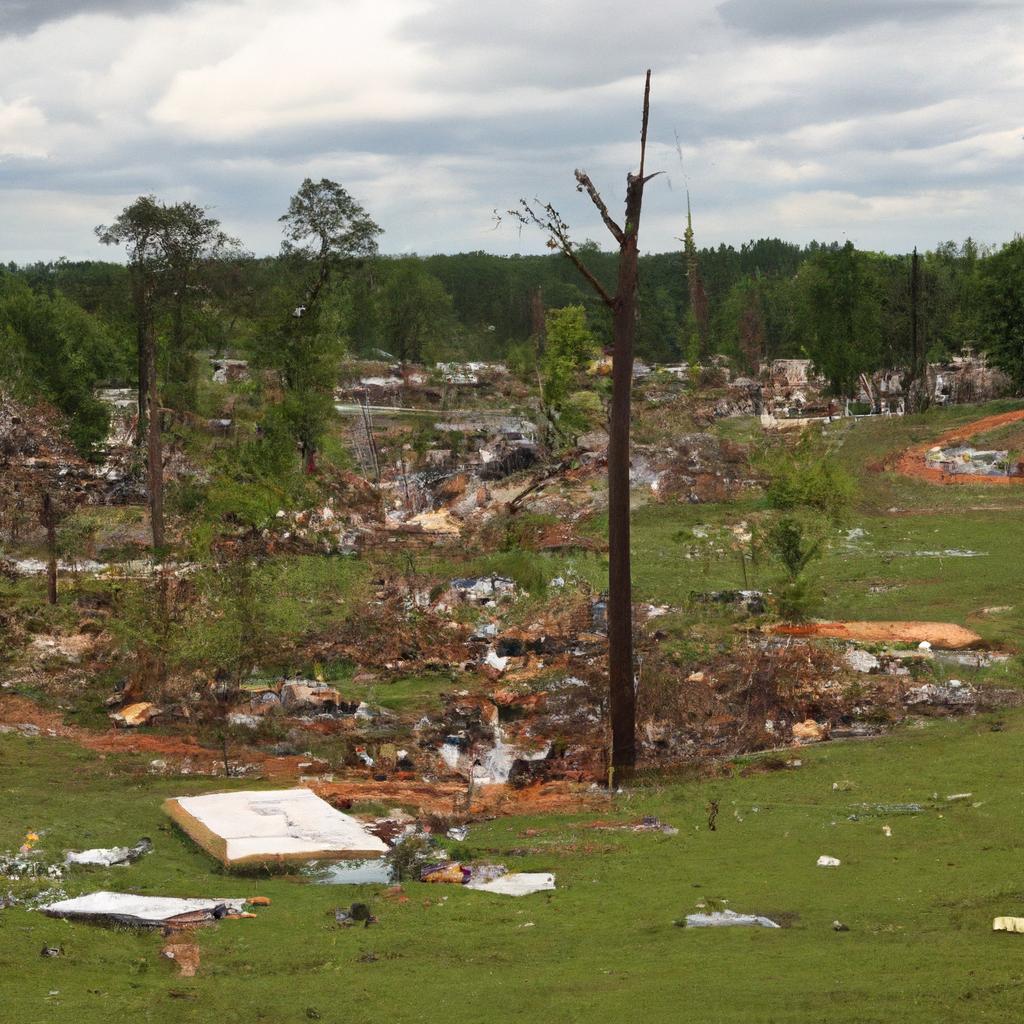Several months following the devastating impact of an EF-3 tornado in a Georgia county located southwest of Atlanta, officials have expressed their disappointment after a federal agency denied their request for additional assistance in the recovery process.
Zac Steele, the Director of Troup County Emergency Management Agency, voiced his frustration during a news conference, stating, “We are clearly disappointed that the disaster declaration did not come to fruition.”
Steele elaborated on the situation, mentioning that FEMA mandates a minimum threshold of $19 million in statewide damages, which unfortunately was not met in this case.
The severe storm that struck the area on March 26 resulted in the destruction of approximately 25 to 30 homes, with an additional 100 homes suffering varying degrees of damage. Fortunately, only five individuals in Georgia sustained minor injuries, a stark contrast to the 25 fatalities in Mississippi and one in Alabama.
In a recent statement, FEMA justified their decision by stating that the damage did not exceed the capabilities of the state, local governments, and voluntary agencies, hence ruling out the provision of supplemental federal assistance.
Community Response
Steele highlighted that the request submitted by the Georgia Emergency Management Agency, representing multiple counties including Troup, aimed to address expenses related to damage, debris removal, and overtime pay for first responders.
Despite the setback of FEMA’s denial, Steele emphasized that the recovery efforts will not be hindered, as reported by WAGA-TV.
He reassured the community by stating, “We will explore local alternatives, seek community grants, and utilize any available resources to support our citizens. That is our commitment.”
Steele emphasized that the county’s primary focus remains on assisting residents in need and preparing for any future disasters.
He affirmed, “Our residents are our top priority, and it is our duty to exhaust all possible means to serve them effectively. This commitment will persist.”
Impact of the Tornado
The tornado that struck on March 26 marked the third such incident in Troup County within the year, with wind speeds exceeding 136 mph.
Sgt. Stewart Smith of the county’s sheriff’s office reflected on the situation, stating, “Just as we were beginning to recover from the events of January, we were struck once again. It has been a challenging period for us.”
FEMA Denies Additional Aid for Georgia County Hit by EF-3 Tornado
Residents of Johnson County, Georgia, are left reeling after the Federal Emergency Management Agency (FEMA) denied their request for additional aid following the devastating EF-3 tornado that ravaged the area last month. The tornado, which struck on June 15th, caused widespread destruction, leaving many homes destroyed and families displaced. While the county had received some assistance from FEMA in the immediate aftermath of the storm, the denial of further aid has left many feeling abandoned and overwhelmed.
Background
The EF-3 tornado that hit Johnson County was part of a larger outbreak of severe weather that swept across the southeastern United States. With winds reaching up to 140 mph, the tornado tore through neighborhoods, uprooting trees, damaging buildings, and leaving a path of destruction in its wake. Hundreds of residents were left without power, water, or access to basic necessities in the days following the storm.
FEMA Assistance
Following the tornado, FEMA conducted assessments of the damage in Johnson County to determine the level of assistance needed. The agency provided initial aid in the form of temporary housing, debris removal, and financial assistance to affected residents. However, many residents and local officials felt that the assistance provided was insufficient to address the scale of the devastation.
Denial of Additional Aid
Despite appeals from local officials and representatives, FEMA ultimately denied the request for additional aid for Johnson County. The agency cited various reasons for the denial, including limits on available funds and the level of damage compared to other areas affected by natural disasters. The decision has left many residents frustrated and uncertain about their future.
Impact on the Community
The denial of additional aid has had a significant impact on the community in Johnson County. Many residents are left without the means to rebuild their homes or replace lost belongings. Businesses are struggling to recover from the economic losses caused by the tornado. The lack of support from FEMA has also strained the resources of local government and relief organizations, who are working tirelessly to assist those in need.
Next Steps
In the wake of FEMA’s decision, residents and officials in Johnson County are exploring alternative options to help the community recover. Local fundraising efforts, volunteer initiatives, and partnerships with nonprofit organizations are being pursued to fill the gap left by the denial of additional aid. The community is determined to come together and support each other through this difficult time.
Conclusion
The denial of additional aid for Johnson County by FEMA has highlighted the challenges and complexities of disaster recovery. While the community faces uncertain times ahead, the resilience and strength of its residents offer hope for the future. It is a reminder of the importance of preparedness, cooperation, and solidarity in the face of adversity.


